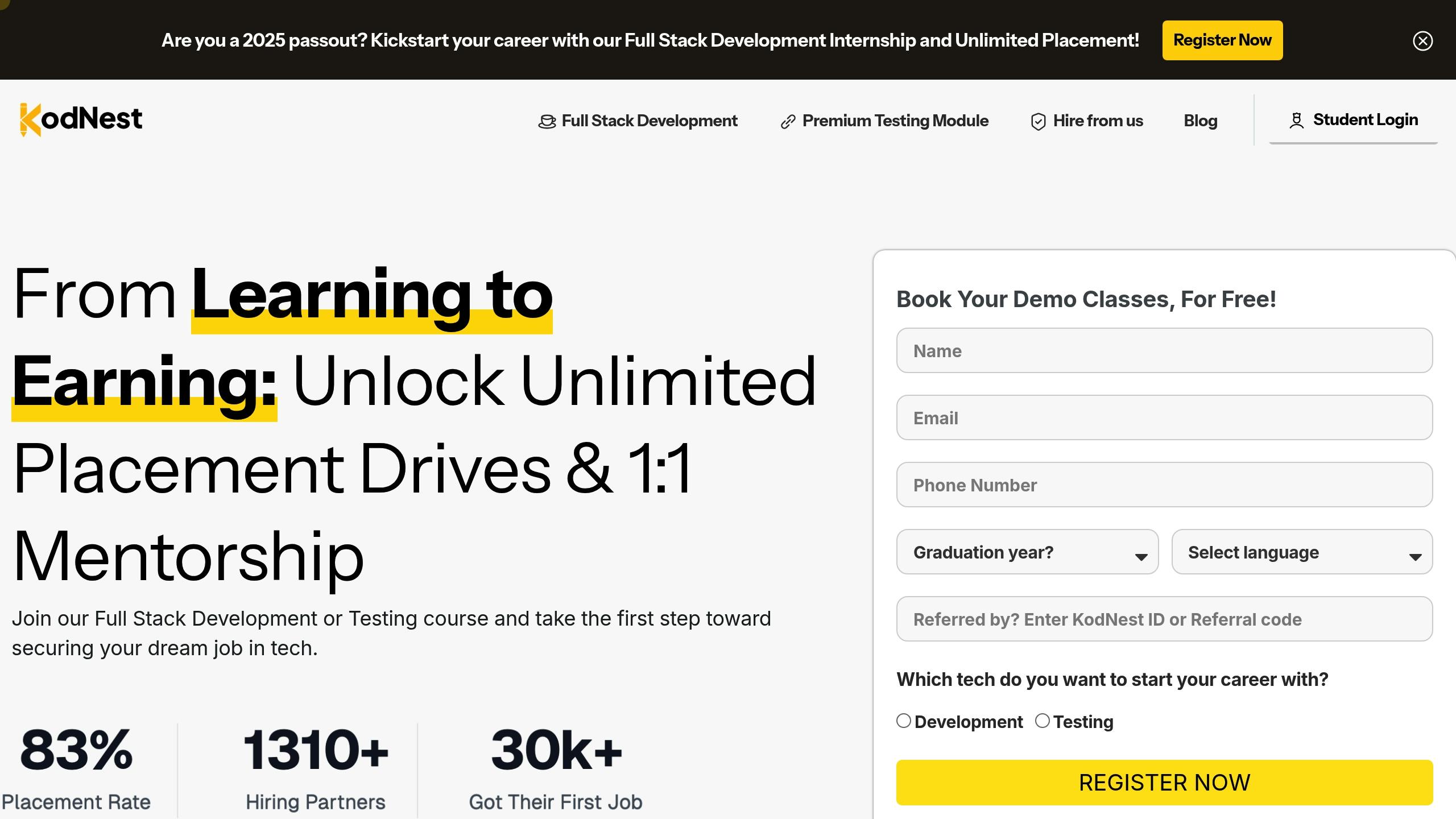Want to land a tech job faster? Certifications can help, but not all are created equal. Here’s the key takeaway: Paid certifications often lead to better job outcomes, with 65% of paid program graduates securing entry-level roles, compared to 35% for free certifications. However, free certifications like FreeCodeCamp still offer a solid starting point for beginners.
Quick Overview:
- Free Certifications: Cost nothing, great for foundational skills, but lack structured support and industry recognition.
- Paid Certifications: Cost $39–$20,000, provide mentorship, career services, and better employer trust.
Quick Comparison:
| Feature | Free Certifications | Paid Certifications |
|---|---|---|
| Cost | Free | $39–$20,000 |
| Completion Rate | 15–25% | 70–85% |
| Support | Limited (forums) | Mentorship, career coaching |
| Recognition | Community trust | Accredited, employer-preferred |
| Job Outcomes | 35% secure entry-level roles | 65% secure entry-level roles |
Bottom line: Start with free certifications if you’re on a budget, but consider paid programs for better job prospects and structured learning.
Free Coding Certifications: Analysis
Why Free Options Are Worth Considering
Free coding certifications come with three major perks beyond just being cost-free:
- They make learning accessible to everyone. For example, 40,000+ FreeCodeCamp alumni now work at companies like Microsoft and Google, proving their impact [11].
- They let you learn at your own pace. Take UpSkill’s 197-lesson web developer course – it allows students to progress whenever it suits them [1].
Drawbacks of Free Certifications
While free programs open doors, they also have some clear downsides. The biggest challenge? They often lack structured support [1].
| Feature | Free Certifications | Paid Certifications |
|---|---|---|
| Mentorship | Community forums only | One-on-one professional help |
| Career Services | Self-directed job search | Dedicated career coaching |
| Project Review | Peer feedback | Professional code review |
| Networking | Informal connections | Direct industry access |
Standout Free Certification Programs
Even with some limitations, free certifications can deliver results – if you put in the effort.
- FreeCodeCamp is a standout option. Its project-based curriculum, covering areas like responsive web design and machine learning, has helped thousands land jobs in tech [2].
- IBM Cloud Essentials is highly regarded by employers. In fact, 62% of cloud engineering hiring managers see it as a solid way to validate foundational skills [10]. This aligns with the 67% employer preference for demonstrated commitment mentioned earlier.
"While 58% of tech recruiters value skill demonstrations over credentials, free certificates require stronger portfolio proof – 73% of hiring managers demand GitHub evidence for non-accredited programs", according to a recent industry survey [8][10].
- SkillCrush WordPress Certification is ideal for those interested in CMS specialization. Impressively, 28% of its graduates have secured freelance roles by showcasing their portfolios [1].
Paid Certifications: Key Features
Paid certifications offer structured guidance to help learners transition from theoretical knowledge to practical, job-ready skills.
What Paid Programs Offer
These programs provide tools and resources designed to improve hiring outcomes, including:
- Professional portfolio reviews that replace peer feedback.
- Direct recruiter connections through partner networks.
- Mentorship to ensure projects align with hiring managers’ expectations [8][10].
- Career transition support, covering everything from resume building to interview preparation.
Top Paid Certification Programs
Some programs have built strong reputations for helping students land jobs. For example:
- CareerFoundry: Their $8,500 Full-Stack program guarantees job placement and includes mentor-led project workflows [1].
- Fullstack Academy: At $19,910, their Online Coding Bootcamp focuses on portfolio development through four detailed projects [1].
- Coding Dojo: For $16,995, their Full-Time Bootcamp covers Python, MERN, and Java with a triple-stack approach tailored to employer demand [1].
"While bootcamps average $10k–$20k, graduates often see significant ROI", according to recent industry data [1][3].
Balancing Costs and Career Gains
Paid certifications address employer concerns about skill verification, as highlighted in a TechTarget survey [5]. For instance, Noble Desktop’s Software Engineering Certificate holders report median salaries 47% higher than those without certifications [3].
To ease the financial burden, many programs offer flexible payment options like income share agreements (where students pay 10-15% of their salary post-hire) or government-subsidized plans [1]. While these programs can be expensive, employment guarantees and higher earning potential make them a worthwhile investment for those seeking a structured career path.
What Employers Think About Certifications
How Employers Rate Certifications
Employers assess certifications based on their relevance to the role and the type of credential. Here’s a breakdown of how these approaches influence hiring decisions:
| Approach | Hiring Impact |
|---|---|
| Free Only | Suitable for junior roles |
| Paid Only | Better for mid-level positions |
| Hybrid | Boosts preference by 73% |
This shows that paid programs, with their structured learning and support, often lead to quicker job placements [12].
KodNest Job Placement Results

Data from KodNest reveals that certified candidates typically find jobs 33% faster – averaging 45 days compared to 60 days for non-certified individuals. Those relying solely on free certifications without internships may face even longer searches, often exceeding 70 days [1][2][4].
"Our certified candidates typically complete their job search in 45 days, compared to the 60-day average for non-certified peers. Those relying solely on free certifications often face extended searches of 70+ days unless complemented by internship experience" [1][2][4].
Employers increasingly favor candidates who combine basic knowledge from free certifications with advanced skills gained through paid programs. This mix demonstrates both dedication and a well-rounded skill set, making these candidates stand out to hiring managers [12][1].
sbb-itb-f454395
Picking the Best Certification Path
Key Decision Points
When planning your certification journey, focus on three main factors based on hiring trends and employer preferences:
- Career Phase: Match certifications to where you are in your career.
- Target Market: Different job markets demand different certifications. For example, KodNest’s 2024 survey reveals that 78% of FAANG companies prefer paid certifications, while only 42% of Series A startups require them [9].
| Market Segment | Recommended Certification Path | Typical Investment |
|---|---|---|
| Enterprise | Paid vendor-specific (e.g., AWS, Azure) | $99-$395 per certification |
| Startups | Free credentials + open-source projects | $300-$700 total |
| Mid-size Companies | A mix of free and paid certifications | $1,000-$2,000 total |
This breakdown reflects employer preferences, where enterprise roles often demand formal certifications, while startups emphasize practical skills.
- Budget Management: Use flexible payment options like Coding Dojo’s Income Share Agreements to make certifications more affordable.
Mixed Learning Strategy
Combining free and paid certifications can help you progress through different career stages effectively:
- Foundation Building: Begin with free certifications, such as the Google IT Support certification, to develop core skills and explore career interests [2].
-
Specialized Training: Add paid certifications tailored to your target role. For example:
- Backend developers can pair MongoDB University‘s free courses with their $150 DBA certification or pursue Oracle’s Java SE certification ($245) for enterprise-focused roles [3].
- Ongoing Development: Plan for renewal costs where necessary:
Focus on renewing certifications only when they directly contribute to career advancement or salary growth.
Conclusion: Making Your Choice
Main Points Review
The certification world in 2025 offers both free and paid options, each catering to different career paths. The big difference? Employer recognition. Free certifications can show initiative, but paid ones often hold more influence during hiring.
Tips for Success
Want to boost your chances with employers? Follow these strategies:
- Start with free certifications to establish your foundational skills. Then, move on to paid programs with strong hiring results, such as AWS certifications, which have been linked to a 47% salary increase for graduates [3].
- Add practical experience by contributing to open-source projects or volunteering for nonprofit tech initiatives. Employers are increasingly looking for both credentials and hands-on proof of skills [6].
- Keep up with trends by choosing certifications that include renewal systems for evolving technologies [9].
This approach aligns with earlier insights about what employers value across different types of organizations.
FAQs
Which tech certification pays the most?
Employers often seek candidates with certifications that reflect highly sought-after technical skills. Below are some of the top-paying certifications for 2025:
| Certification | Average Annual Salary (USD) |
|---|---|
| Google Cloud Certified – Professional Cloud Architect | $175,761 |
| AWS Certified Solutions Architect – Professional | $168,080 |
| Microsoft Certified: Azure Administrator Associate | $148,849 |
| CEH – Certified Ethical Hacker | $146,260 |
| CDPSE – Certified Data Privacy Solutions Engineer | $146,033 |
Keep in mind, salaries can differ based on factors like location, years of experience, and how much demand there is in the industry for specific skills [6][1]. While certifications can significantly improve earning potential, employers often look for a mix of credentials and hands-on experience.
"Cloud computing certifications, particularly from Google and AWS, consistently rank among the highest-paying tech certifications, with cybersecurity certifications like CISSP and CISM following closely behind in terms of market value" [6][7].
Key takeaways:
- High demand for specialized skills: Certifications in areas like cybersecurity and data privacy offer strong earning potential due to growing concerns about security and stricter data protection laws [1].
- Cost vs. benefit: Although many certifications come with upfront fees, they often prove worthwhile in enterprise settings [1].
For those just starting out, consider free certifications like IBM Cloud Essentials to build foundational knowledge. From there, you can work toward higher-paying credentials like AWS Solutions Architect, which averages $168,080 annually.
These certifications reflect ongoing employer preferences for vendor-specific expertise in enterprise environments.
Related Blog Posts
- What makes an institute stand out for full stack development training in India?
- 5 HackerRank Certifications That Can Boost Your Resume as a Fresher
- What are the best online certification courses for landing an IT job?
- “Will I Get a Job with Backlogs?” How to Overcome Academic Hurdles and Land IT Roles





